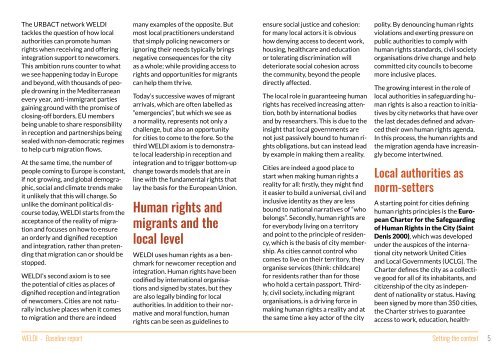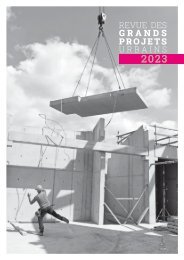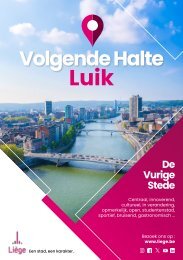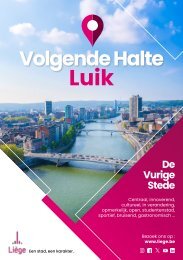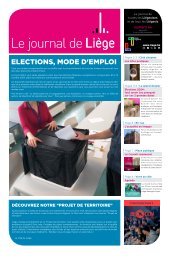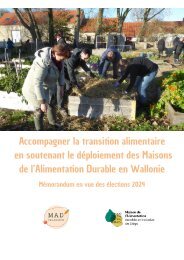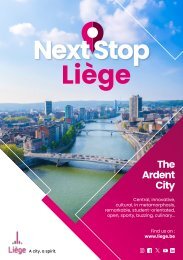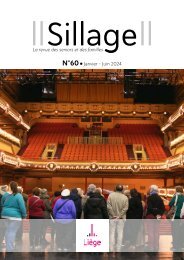Create successful ePaper yourself
Turn your PDF publications into a flip-book with our unique Google optimized e-Paper software.
The URBACT network <strong>WELDI</strong><br />
tackles the question of how local<br />
authorities can promote human<br />
rights when receiving and offering<br />
integration support to newcomers.<br />
This ambition runs counter to what<br />
we see happening today in Europe<br />
and beyond, with thousands of people<br />
drowning in the Mediterranean<br />
every year, anti-immigrant parties<br />
gaining ground with the promise of<br />
closing-off borders, EU members<br />
being unable to share responsibility<br />
in reception and partnerships being<br />
sealed with non-democratic regimes<br />
to help curb migration flows.<br />
At the same time, the number of<br />
people coming to Europe is constant,<br />
if not growing, and global demographic,<br />
social and climate trends make<br />
it unlikely that this will change. So<br />
unlike the dominant political discourse<br />
today, <strong>WELDI</strong> starts from the<br />
acceptance of the reality of migration<br />
and focuses on how to ensure<br />
an orderly and dignified reception<br />
and integration, rather than pretending<br />
that migration can or should be<br />
stopped.<br />
<strong>WELDI</strong>’s second axiom is to see<br />
the potential of cities as places of<br />
dignified reception and integration<br />
of newcomers. Cities are not naturally<br />
inclusive places when it comes<br />
to migration and there are indeed<br />
many examples of the opposite. But<br />
most local practitioners understand<br />
that simply policing newcomers or<br />
ignoring their needs typically brings<br />
negative consequences for the city<br />
as a whole; while providing access to<br />
rights and opportunities for migrants<br />
can help them thrive.<br />
Today’s successive waves of migrant<br />
arrivals, which are often labelled as<br />
“emergencies”, but which we see as<br />
a normality, represents not only a<br />
challenge, but also an opportunity<br />
for cities to come to the fore. So the<br />
third <strong>WELDI</strong> axiom is to demonstrate<br />
local leadership in reception and<br />
integration and to trigger bottom-up<br />
change towards models that are in<br />
line with the fundamental rights that<br />
lay the basis for the European Union.<br />
Human rights and<br />
migrants and the<br />
local level<br />
<strong>WELDI</strong> uses human rights as a benchmark<br />
for newcomer reception and<br />
integration. Human rights have been<br />
codified by international organisations<br />
and signed by states, but they<br />
are also legally binding for local<br />
authorities. In addition to their normative<br />
and moral function, human<br />
rights can be seen as guidelines to<br />
ensure social justice and cohesion:<br />
for many local actors it is obvious<br />
how denying access to decent work,<br />
housing, healthcare and education<br />
or tolerating discrimination will<br />
deteriorate social cohesion across<br />
the community, beyond the people<br />
directly affected.<br />
The local role in guaranteeing human<br />
rights has received increasing attention,<br />
both by international bodies<br />
and by researchers. This is due to the<br />
insight that local governments are<br />
not just passively bound to human rights<br />
obligations, but can instead lead<br />
by example in making them a reality.<br />
Cities are indeed a good place to<br />
start when making human rights a<br />
reality for all: firstly, they might find<br />
it easier to build a universal, civil and<br />
inclusive identity as they are less<br />
bound to national narratives of “who<br />
belongs”. Secondly, human rights are<br />
for everybody living on a territory<br />
and point to the principle of residency,<br />
which is the basis of city membership.<br />
As cities cannot control who<br />
comes to live on their territory, they<br />
organise services (think: childcare)<br />
for residents rather than for those<br />
who hold a certain passport. Thirdly,<br />
civil society, including migrant<br />
organisations, is a driving force in<br />
making human rights a reality and at<br />
the same time a key actor of the city<br />
polity. By denouncing human rights<br />
violations and exerting pressure on<br />
public authorities to comply with<br />
human rights standards, civil society<br />
organisations drive change and help<br />
committed city councils to become<br />
more inclusive places.<br />
The growing interest in the role of<br />
local authorities in safeguarding human<br />
rights is also a reaction to initiatives<br />
by city networks that have over<br />
the last decades defined and advanced<br />
their own human rights agenda.<br />
In this process, the human rights and<br />
the migration agenda have increasingly<br />
become intertwined.<br />
Local authorities as<br />
norm-setters<br />
A starting point for cities defining<br />
human rights principles is the European<br />
Charter for the Safeguarding<br />
of Human Rights in the City (Saint<br />
Denis 2000), which was developed<br />
under the auspices of the international<br />
city network United Cities<br />
and Local Governments (UCLG). The<br />
Charter defines the city as a collective<br />
good for all of its inhabitants, and<br />
citizenship of the city as independent<br />
of nationality or status. Having<br />
been signed by more than 350 cities,<br />
the Charter strives to guarantee<br />
access to work, education, health-<br />
<strong>WELDI</strong> - Baseline <strong>report</strong> Setting the context 5


